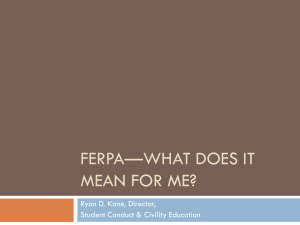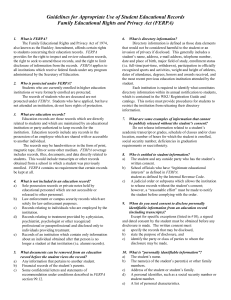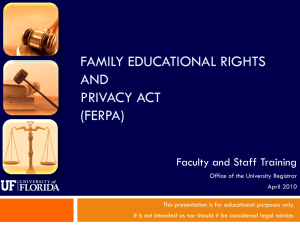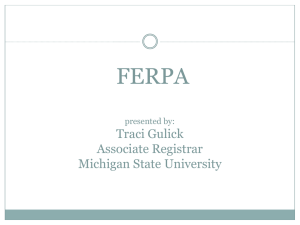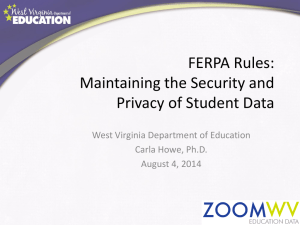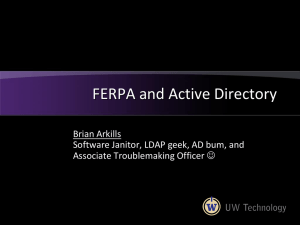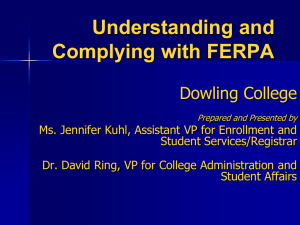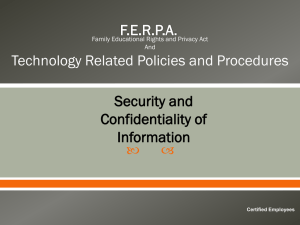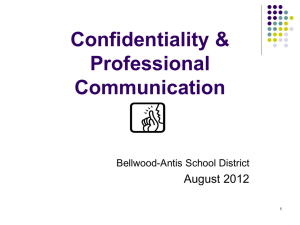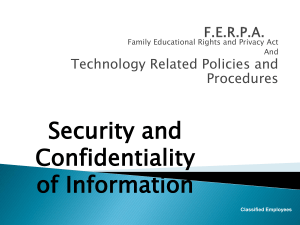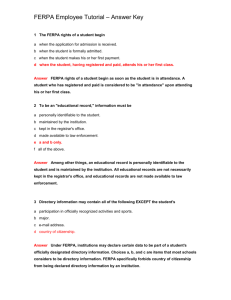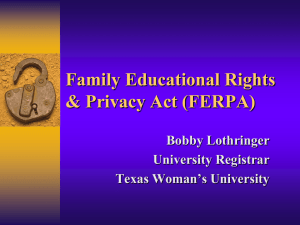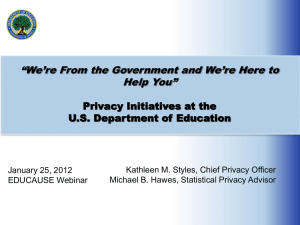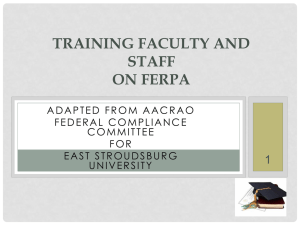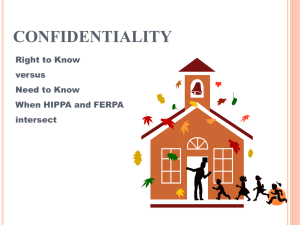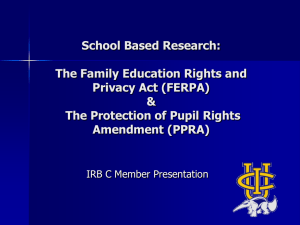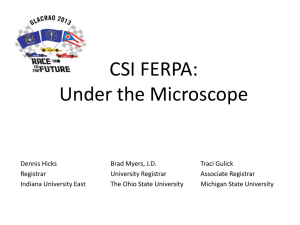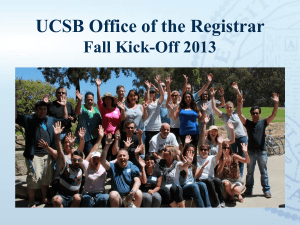FERPA - Muhlenberg College
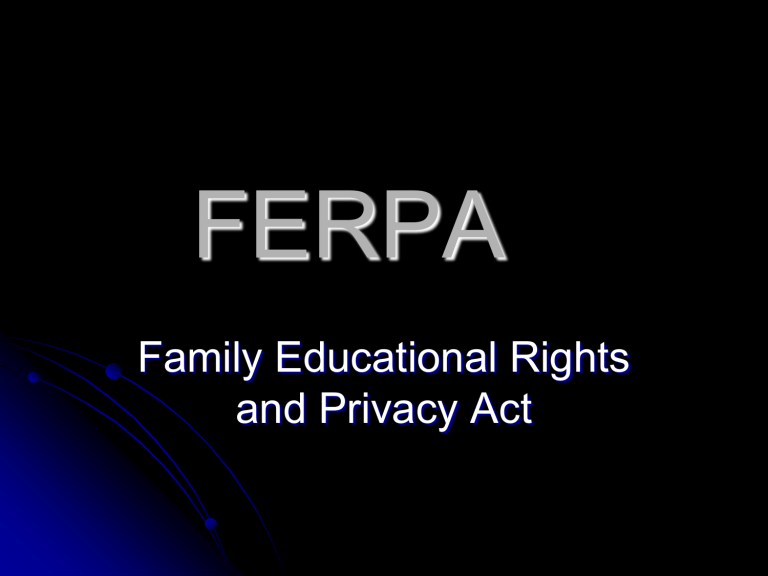
FERPA
Family Educational Rights and Privacy Act
1.
2.
3.
4.
8.
9.
10.
5.
6.
7.
How much do you know about FERPA?
Take the FERPA Quiz Challenge!!
Please answer True or False for the following questions:
_____ Education records include only those records contained in a student’s permanent file.
_____ A student has a right to inspect his or her educational records within
10 days of the request.
_____ Faculty/staff have a right to inspect and review the education records for any student.
_____ An advisor does not have to allow a student to inspect and review her personal notes about the student that are held in a file in the desk of the advisor’s office.
_____ If a student is a dependent, Muhlenberg is required to give his/her parents information.
_____ Directory information can be released without consent of the student.
_____ Graded homework may be placed outside faculty offices for students to pick up if placed in some sort of container.
_____ Muhlenberg must annually notify students of their rights under FERPA.
_____ Admissions records are “education records,” therefore covered under
FERPA.
_____ Sally Student has just been found in violation of the college’s alcohol policies. Her RA could contact her parents about this issue without her permission.
Family Educational Rights and
Privacy Act of 1974
“A Federal law designed to protect the privacy of education records, to establish the right of students to inspect and review their education records, and to provide guidelines for the correction of inaccurate and misleading data through informal and formal hearings.”
This Act is enforced by the Family Policy
Compliance Office, U.S. Department of
Education, Washington, D.C.
The Essence of the Act
College Students must be permitted to inspect their own education records.
School officials may not disclose personally identifiable information about students nor permit inspection of their records without written permission (unless such action is covered by certain exceptions permitted by the Act).
College Students must be given the opportunity to challenge the accuracy of their educational record.
What is an Education Record?
Any Record (with certain exceptions)
1.
2.
3.
Maintained by an institution
Directly related to a student: can contain a student’s name or information from which an individual student can be personally identified.
Includes files, documents, and materials in whatever medium (handwriting, print, tapes, computer files, microfiche) which contain information directly related to students and from which students can be personally identified.
1.
2.
3.
4.
5.
What an Education Record is
Not!
Sole possession record
Law enforcement unit record
Employment record
Medical record
Alumni record
When does an Education Record begin?
Persons who applied for admission but were not accepted have no rights under
FERPA.
At Muhlenberg applicants are not considered students and do not have
FERPA rights.
An Education Record and FERPA rights begin when a student is registered for classes.
Protecting Education Records
Be careful not to allow others access to student information.
For example:
1.
Don’t post grade information
2.
3.
Don’t post using an SSN or Berg ID
Don’t leave graded material where it is accessible to individuals other than the student
Directory Information
Information not normally considered a violation of a person’s privacy
Students must be notified of the items of
Directory Information
Students must be given the opportunity to request that Directory Information not be released. This right of non-disclosure applies to Directory Information only.
Muhlenberg’s Directory Information
Student’s name
College mail box and telephone number
Permanent home address and telephone number
Email address
Class year
Major field of study
Student status (full-time/part-time)
Dates of attendance
Degree(s) and or awards received
Participation in officially recognized College activities
(including but not limited to intercollegiate athletics)
Height and weight of student athletes
Directory Information can NEVER be:
Race
Gender
Social Security Number
Student Identification Number
Grades
GPA
Country of Citizenship
Religion
Directory Information
It is important to remember that “directory information” is defined
If a data element isn’t defined as “directory information” it isn’t directory information and can only be released if the student’s written permission is obtained or the release can be justified under one of the exceptions to students’ written permission found in FERPA.
Requirements for Compliance
What we must do ...
Provide annual notification to students of their FERPA rights
1.
2.
3.
College catalog
Student Policy and Resource Guide
Registrar’s Web Site
Requirements for Compliance
Provide annual notification to students of their right to:
1.
Inspect and review their education records
2.
3.
4.
5.
Request an amendment to their education records
A hearing if the request for an amendment is unsatisfactory
Request that the institution not disclose directory information items about them
File a complaint with the U.S. Department of
Education
Requirements for Compliance
Students should know that School Officials within the institution may obtain information from education records without obtaining prior written consent.
Students should know that while they must authorize disclosure of their education records, they do not have the right to deny release of their records in cases where
FERPA authorizes disclosure without consent.
School Officials
Employed by the College in an administrative, supervisory, academic, research, or support staff position (including law enforcement and health staff personnel)
Elected to the Board of Trustees
Company employed by or under contract to the
College to perform a special task such as the attorney, auditor, or collection agency
Student serving on an official committee, such as a disciplinary or grievance committee, or assisting another school official in performing his or her tasks (including work study students)
Legitimate Educational Interest
The demonstrated need to know by those officials of an institution who act in the student’s educational interest, including faculty, administration, clerical and professional employees, and other persons who manage student record information.
Although FERPA does not define
“legitimate educational interest,” it states that institutions must specify the criteria for determining it.
Muhlenberg’s Definition of
Legitimate Educational Interest
A school official has a legitimate educational interest if the official needs to review an education record in order to fulfill his or her professional responsibility.
Requirements for Compliance
Provide students access to their education records. They have the right to inspect and review within 45 days of the request to inspect.
1.
2.
3.
Limitations on the right to inspect
Parental financial information
Confidential letters and recommendations to which the student has waived his/her right of inspection
Education records containing information about more than one student
“Must” release information
Institutions MUST disclose education records to students who request the information from their own records.
This is the only example in FERPA where we MUST release information about a student.
Student’s Written Permission
Institutions shall obtain written consent from the student before disclosing any personally identifiable information from their education records (with the authorized exceptions). The written consent must:
1.
2.
3.
Specify the records to be released
Identify the party or parties to whom disclosure may be made
Be signed and dated by the student
What about Parents?
Institutions MAY disclose information about students to their parents by any of three procedures:
1.
2.
3.
By obtaining the student’s written consent
By having the parents establish the student’s dependency as defined by Internal Revenue
Code of 1986, Section 152
By exercising its disclosure option on any students under age 21 regarding a violation of an institutional rule or federal, state, or local law regarding the use of alcohol or controlled substance
Say it again
When a student reaches the age of 18 OR begins attending a postsecondary institution regardless of age, FERPA rights transfer to the student.
Parents may obtain non-directory information (grades, gpa, etc.) only at the discretion of the institution AND after it has been determined that their child is legally their dependent.
Parents may also obtain non-directory information by obtaining a signed consent from their child.
What do we do at Muhlenberg?
First year students are given a form at June
Orientation that allows them to give parents access to their education records
This data is stored in CapStone and may be viewed on the web
Before giving a parent any information, check to see if the student has given permission
If the student has not given permission, you will not be able to give any information to the parents until they have submitted their most recent tax return, showing the dependent status of their child.
1.
2.
3.
4.
5.
6.
7.
8.
9.
10.
The FERPA Quiz Challenge
__F___ Education records include only those records contained in a student’s permanent file.
__F___ A student has a right to inspect his or her educational records within
10 days of the request.
__F___ Faculty/staff have a right to inspect and review the education records for any student.
__T___ An advisor does not have to allow a student to inspect and review her personal notes about the student that are held in a file in the desk of the advisor’s office.
__F___ If a student is a dependent, Muhlenberg is required to give his/her parents information.
__T___ Directory information can be released without consent of the student.
__F___ Graded homework may be placed outside faculty offices for students to pick up if placed in some sort of container.
__T___ Muhlenberg must annually notify students of their rights under
FERPA.
__F___ Admissions records are “education records,” therefore covered under
FERPA.
__T___ Sally Student has just been found in violation of the college’s alcohol policies. Her RA could contact her parents about this issue without her permission.
Do you know what to do?
If there is any question in your mind regarding any request for education record information, it is always better to err on the conservative side and ask for guidance.
Family Policy Compliance Office ferpa@ed.gov
www.ed.gov/offices/OM/fpco.html
Office of the Registrar
(484) 664-3190 tamte-horan@muhlenberg.edu
www.muhlenberg.edu/mgt/registrar
